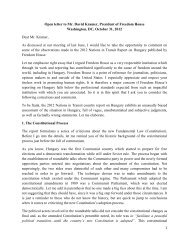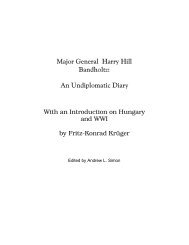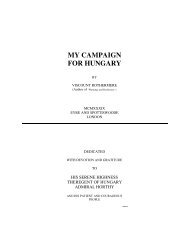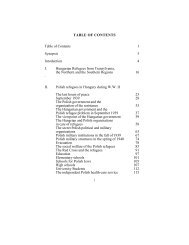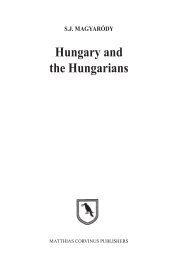The Fate of Western Hungary 1918-1921 - Corvinus Library ...
The Fate of Western Hungary 1918-1921 - Corvinus Library ...
The Fate of Western Hungary 1918-1921 - Corvinus Library ...
You also want an ePaper? Increase the reach of your titles
YUMPU automatically turns print PDFs into web optimized ePapers that Google loves.
proclamation <strong>of</strong> the state <strong>of</strong> Lajta-Banate. <strong>The</strong> prime minister instructed Gyula<br />
Gömbös at the end <strong>of</strong> September to prevent the possible proclamation <strong>of</strong><br />
independence by the territory. On September 29, Gömbös met with supreme<br />
commander Prónay and informed him that the government must give up<br />
<strong>Western</strong> <strong>Hungary</strong> but that there would be a plebiscite in Sopron and its<br />
surrounding. Hence, he asked Prónay to take over public administration over<br />
the entire territory, except the noted district, without proclaiming a “separate<br />
imperium.”<br />
In these critical days and weeks, to keep the events <strong>of</strong> <strong>Western</strong> <strong>Hungary</strong> in<br />
hand, the Hungarian government made use <strong>of</strong> censorship, against which the<br />
National Assembly opposition, and the minority pro-monarchist party, put up<br />
spirited resistance. One <strong>of</strong> their targets was ministerial advisor Tibor Eckhardt<br />
(1888-1972), head <strong>of</strong> the prime ministerial press department, who regularly<br />
showed up in the parliament’s gallery. In his September 24 speech on the floor<br />
<strong>of</strong> Parliament, representative Rakovszky also commented that “hardly a week<br />
goes by that the outrages <strong>of</strong> censorship are not raised here. (…) with bullying<br />
and cunning, free expression is suppressed. Newspapers that do not give in to<br />
censorship are eradicated, discarded. (…) Is the Prime Minister willing to act,<br />
to order media chief Tibor Eckhardt to handle censorship unbiased, and not use<br />
it for the dissemination <strong>of</strong> his own political views, and not for the persecution<br />
and discrediting <strong>of</strong> opposing views and those who hold them?” 411<br />
In response to the questions posed by Rakovszky, PM Bethlen read out the<br />
instructions given to the media publicity <strong>of</strong>fice with regard to the matter: “In<br />
the matter <strong>of</strong> the question <strong>of</strong> <strong>Western</strong> <strong>Hungary</strong>, all communiqués are banned<br />
that would upset our relations with our neighbors. Thus, it is especially not<br />
permissible to call for organizing or resistance against Austrians, as well as<br />
military threats, or voicing intent to support against Austria. Furthermore, calls<br />
or proclamations, which call on the population to volunteer or <strong>of</strong>fer military<br />
resistance, and generally prevent the handover <strong>of</strong> <strong>Western</strong> <strong>Hungary</strong> by armed<br />
conflict, is not to be published. This ban is primarily aimed at those<br />
proclamations, whose publication and distribution has already happened over<br />
the signature <strong>of</strong> the Supreme Command <strong>of</strong> the <strong>Western</strong> <strong>Hungary</strong> National<br />
Defense Organization.” 412 <strong>The</strong> prime minister promised an unbiased review in<br />
the matter <strong>of</strong> censorship.<br />
<strong>The</strong> Italian Foreign Minister, Marquis Pietro Tomasi Della Toretta, invited<br />
the representatives <strong>of</strong> Austria and <strong>Hungary</strong> to Venice on October 1 to settle the<br />
<strong>Western</strong> <strong>Hungary</strong> question. Shortly after, on October 3, the Entente Mission<br />
generals and Lt.Gen. Hegedűs signed an agreement in Sopron. Its substance<br />
was that <strong>Hungary</strong> has handed over to Austria the territory specified in the<br />
Entente memorandum <strong>of</strong> September 23. <strong>The</strong> representative <strong>of</strong> the Austrian<br />
government did not sign the document saying: “Zone ‘A’ is still under rebel<br />
control. <strong>The</strong> agreement is in pro forma agreement that <strong>Hungary</strong> has fulfilled<br />
411 Nemzetgyűlési Napló, XIII. kötet. <strong>1921</strong>, pp. 72, 74.<br />
412 Ibid, pp. 75–76.<br />
157




